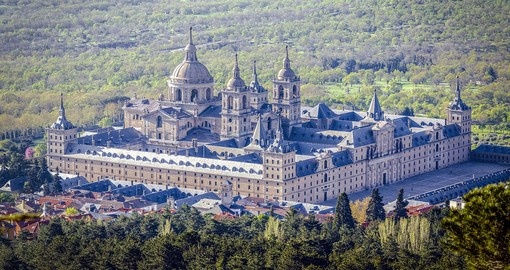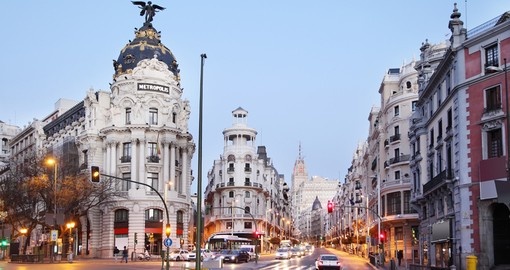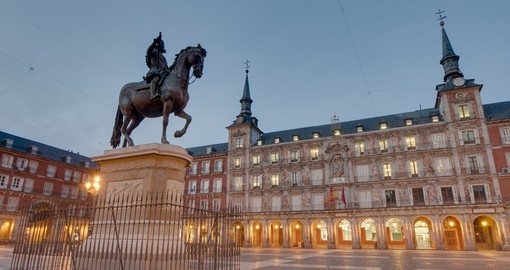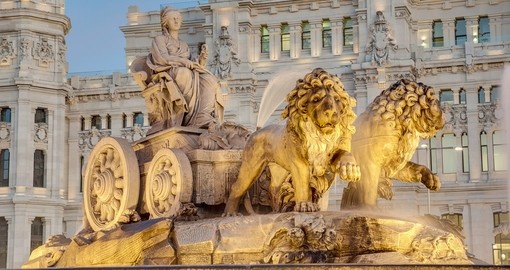Spain History
Since prehistoric times, much of the Iberian Peninsula has been occupied by varying cultural groups. It is believed that people came to Spain around 35,000 BC, and evidence of early human settlements can be found in cave paintings located in the Cave of Altamira. Named a World Heritage Site by UNESCO in 1985, these incredibly detailed paintings are well preserved and are considered by many to be one of the first examples of true artwork. The skill, range and creativity presented in the paintings are unparalleled, providing a unique window into the past.
The Iberians, for whom the peninsula is named, arrived from the East, settling much of the eastern coast by 4,000 BC. The Celts were the next to come, choosing to establish themselves in the interior and to the northwest. As a result of Spain’s long coastlines, it became popular with the Phoenicians, Greeks and Carthaginians, who built trading settlements along the water.
Roman conquest of the peninsula was completed in 19 BC, maintaining a strong cultural influence over the land for the next six centuries. With Roman power came the Latin language, a Roman style of law, and the Christian religion. When the empire fell in the 5th century AD, Spain was taken over by another foreign power: the Visigoths. Despite being a Germanic people, the Visigoths respected a great deal of Roman culture and institutions, and as such, the Iberian Peninsula did not change that much.
At the beginning of the 8th century, Muslims from northern Africa launched an attack on the peninsula and within a few years gained control. The Moors remained for around seven centuries but faced opposition from Christian kingdoms situated in the north. These kingdoms were eventually successful in moving the influence of the Moors to the southern part of the peninsula.
The year 1469 witnessed the marriage of two Catholic monarchs, Isabelle of Castile and Ferdinand of Aragon. While this marriage united two kingdoms, it also started the Spanish Inquisition in 1478. In an attempt to convert more of the population to Christianity, the Inquisition instituted the expulsion or death of those Jews and Moors who refused to leave their religion.
In 1492, Isabella and Ferdinand authorized the expedition of explorer Christopher Columbus. The discovery of the New World later that year signalled the beginning of great wealth for Spain. Known as the Golden Age, with gold, silver and other treasures from the New World, Spain had the riches necessary to expand at an unprecedented rate. Unfortunately, by the 17th century, the burden of an empire became too much and Spain was not able to capitalize on its early success.
During the 19th century, Spain was heavily divided between conservatives and liberals. The government was unstable and changes in power were frequent. In 1931, the king of Spain was forced to abdicate, thus making the nation a republic. A few short years later, the Spanish Civil War was rampant in the country and much blood was spilled from 1936 to 1939.
General Francisco Franco became the sole leader of the country and quickly became a nationalist dictator. He banned certain languages, instituted a network of secret police, encouraged censorship, and sentenced thousands of people to death or in concentration camps. While certain policies were relaxed as Franco got older, he remained a dictator until his death in 1975.
A new era of liberal democracy came to Spain following Franco’s death. In 1986, the country joined the European Union and enjoyed a great deal of growth. 1992 witnessed two special events, the Olympics in Barcelona and the Seville Expo, both of which garnered international attention. In 1999, the nation adopted the euro and saw economic success into the 2000s.
Spain remains a favourite spot among travellers. Diverse landscapes and cultures welcome visitors with open arms. Great weather, nightlife, beaches, music, art, and food await those looking for adventure and excitement.
Spain Travel Information
At Goway we believe that a well-informed traveller is a safer traveller. With this in mind, we have compiled an easy-to-navigate travel information section dedicated to Spain.
Learn about the history and culture of Spain, the must-try food and drink, and what to pack in your suitcase. Read about Spain's nature and wildlife, weather and geography, along with Country Quickfacts compiled by our travel experts. Our globetrotting tips, as well as our visa and health information, will help ensure you're properly prepared for a safe and enjoyable trip. The only way you could possibly learn more is by embarking on your journey and discovering Spain for yourself. Start exploring… book one of our Spain tours today!
Get a Trip Quote Order a Brochure





















